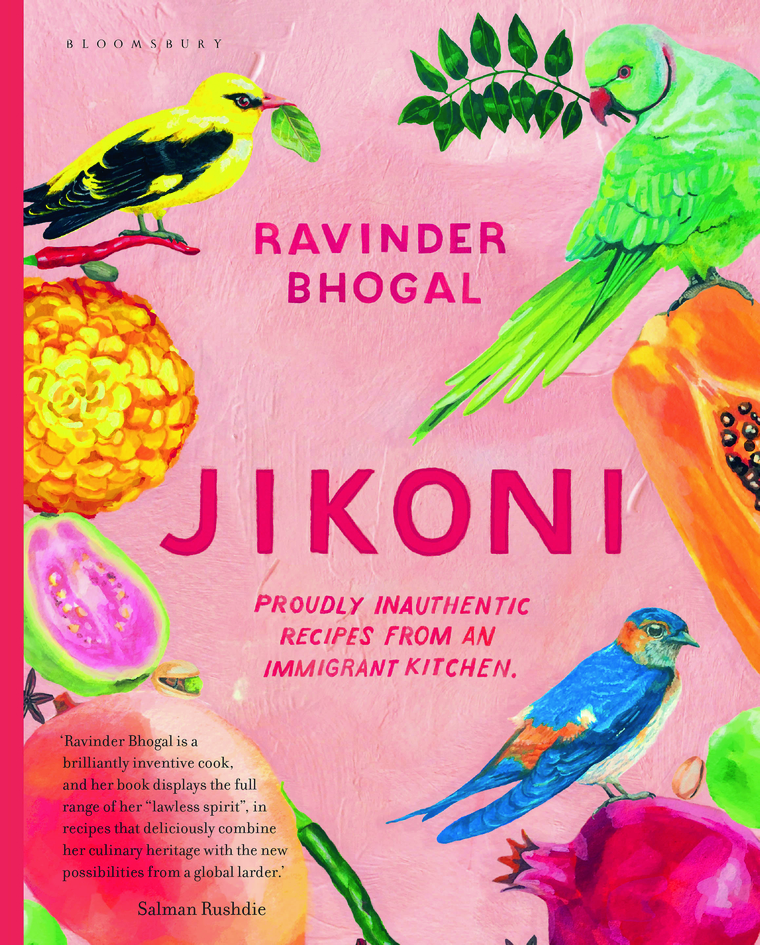Interview: Ravinder Bhogal On Her New Cookbook ‘Jikoni: Proudly Inauthentic Recipes From An Immigrant Kitchen’
By Something CuratedFood writer, restaurateur and chef, Ravinder Bhogal, behind Marylebone restaurant Jikoni, was born in Kenya to Indian parents. When she immigrated to London as a child, the cooking of her new home collided with a heritage that crossed continents. What materialised was a playful approach to the world’s larder, represented in Bhogal’s lawless concoctions that draw their influences from one tradition and then another. Collated in her new cookbook, Jikoni: Proudly Inauthentic Recipes from an Immigrant Kitchen, Bhogal joyfully documents dishes like Cauliflower Popcorn with Black Vinegar Dipping Sauce; Lamb and Aubergine Fatteh; or an irresistible Banana Cake accompanied by Miso Butterscotch and Ovaltine Kulfi. These diverse recipes are bolstered by evocative stories from a past that illustrates the powerful relationship between food, people, place and identity. To learn more about Bhogal, the birth of Jikoni, and her fascinating new cookbook, Something Curated spoke with the chef.

Something Curated: Can you give us some insight into your background; how did you enter the field of food?
Ravinder Bhogal: It was really fate that lead me to a career in food. I was born in Kenya surrounded by an incredible benevolent landscape that gifted us the most wonderful produce so it’s no surprise that I grew up with a deep appreciation of food and cooking. I never trained as a chef but always cooked. While I was working as a journalist, a dear friend convinced me to enter a televised cookery competition as she had a strong premonition that I would win. She was right – much to my surprise I won and this completely changed the course of my life and career.
SC: How was Jikoni born?
RB: Jikoni took years of work to put together. I worked in other people’s restaurants doing pop ups and private catering before I really understood what I wanted my restaurant’s philosophy and culture to be. We cook food inspired by immigrants and celebrate a maternal way of cooking which I think is quite underrepresented. I think subconsciously I also created a place with Jikoni to which I felt I could truly belong. As an immigrant I had often struggled to fit in, but at Jikoni I had finally created a space that I felt represented who I was – East African, Indian, British & an immigrant.
SC: Tell us about your latest delivery venture, Comfort & Joy.
RB: Comfort & Joy is a globally inspired meal delivery service we launched in June this year. It is a little sister brand to Jikoni. Each meal box contains four vibrant vegetarian or vegan dishes that we think create a comforting, joyful and balanced meal. We felt strongly that we did not want to compromise on any of our values so all our packaging is 100% home compostable – it turns to soil in 90 days so zero plastic. We have shortened our supply chain and work with producers who look after the environment, use green energy to cook and for every meal sold-we donate one to someone vulnerable or homeless in the U.K. through our charity partner NishkamSWAT. We are really proud to have launched such a positive and regenerative business during such challenging times.
SC: What is the thinking behind your newly published book, Jikoni: Proudly Inauthentic Recipes from an Immigrant Kitchen?
RB: It is a very personal book full of essays about the people who have inspired and moved me. The recipes are a love letter to immigrants – those who have an ache for what they left behind but a wonder of their new landscape – it’s when these two things are reconciled that we see exciting hybrid dishes that honour old traditions but overlay the new. It’s about adaptation, cooking without borders and celebrating our similarities and the intricacies of our differences.

SC: How did you decide on the recipes to include in it?
RB: The recipes in it are the ones I love the most and ones that have a real narrative and story.
SC: How do you envisage the future of the restaurant industry in London, in light of the pandemic?
RB: I think we have a tough few years ahead of us but I think it is a chance for us to re-engineer the world around us to create better work environments with more balance. It’s incredible what can change when it has to and sometimes it’s in our greatest adversity that we find the most hope.
Images courtesy Jikoni